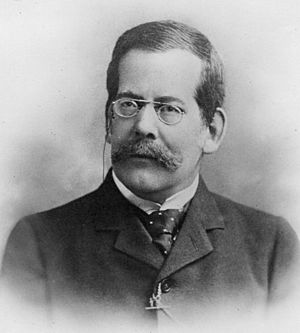Henry Sweet facts for kids
Quick facts for kids
Henry Sweet
|
|
|---|---|
 |
|
| Born | 15 September 1845 |
| Died | 30 April 1912 (aged 66) |
| Nationality | British |
| Alma mater | Balliol College |
| Scientific career | |
| Fields | Phonetics, Old English, language teaching |
| Institutions | Early English Text Society, Philological Society, Oxford University |
Henry Sweet (born September 15, 1845 – died April 30, 1912) was a British expert in languages. He was a philologist, a phonetician, and a grammarian.
A philologist studies languages, their history, and how they change. Henry Sweet focused on Germanic languages, especially Old English and Old Norse. He also wrote about phonetics, which is the study of speech sounds. Sweet shared his ideas on grammar and how to teach languages. Many of his ideas are still important today. His books are even used in colleges and universities.
Contents
Henry Sweet's Life and Work
Henry Sweet was born in London, England. He went to school in London before studying briefly in Germany. In 1869, at age 24, he earned a scholarship to Balliol College in Oxford.
Early Studies and Discoveries
While at Oxford, Sweet focused on his own language studies. He didn't always follow the usual schoolwork. Early on, a respected group called the Philological Society published his paper on Old English. He later became the president of this society.
In 1871, he edited a very old book for the Early English Text Society. This book was King Alfred's translation of Cura Pastoralis. Sweet's work helped create the study of Old English dialectology. This is how we learn about different ways Old English was spoken. He finished his degree in 1873.
Key Works on Old English
Sweet wrote several important books about Old English. These include An Anglo-Saxon Reader (1876). This book helped many people learn Old English. He also wrote The Oldest English Texts (1885). Later, he created A Student's Dictionary of Anglo-Saxon (1896).
Pioneering Phonetics and Language Teaching
In 1877, Sweet published A Handbook of Phonetics. This book was very popular around the world. It helped scholars and teachers understand speech sounds better. He then wrote Elementarbuch des gesprochenen Englisch (1885). This book was later made into A Primer of Spoken English (1890).
This book described the way educated people in London spoke. This way of speaking is now known as received pronunciation. He even showed how it sounded using phonetic script. Sweet also created a type of shorthand writing called Current Shorthand.
His focus on spoken language and sounds made him a leader in language teaching. He wrote about this in The Practical Study of Languages (1899). In 1901, Oxford University made him a reader in phonetics. His last book on English pronunciation was The Sounds of English (1908).
Other Contributions
Sweet also wrote An Icelandic Primer with Grammar, Notes and Glossary (1886). He wrote The History of Language (1900) as well. He helped with the early work on the famous Oxford English Dictionary.
Even though he was a brilliant scholar, Sweet never became a full professor at Oxford. This made him quite sad. He passed away in Oxford on April 30, 1912.
Sweet's Other Interests
Henry Sweet had many hobbies throughout his life. In a book called Who's Who, 1911, he listed them. As a boy, he enjoyed climbing, gardening, chemistry, and alphabets. When he was young, he liked swimming, skating, and learning European languages. In middle age, he enjoyed riding, fishing, cycling, and discussing literature. He also worked on spelling and university improvements. Later in life, he was interested in how societies work, spiritualism, and music. He even looked forward to "real flying, not with bags and stoves!"
Henry Sweet's Legacy
Henry Sweet is remembered as "the man who taught Europe phonetics." His work helped start a tradition of using applied linguistics in language teaching. This approach is still used today.
His collected papers were published by H. C. Wyld.
The famous playwright George Bernard Shaw was inspired by Sweet. In his 1913 play Pygmalion, the character Henry Higgins has some traits of Sweet. This play was later made into the musical My Fair Lady.
The Henry Sweet Society for the History of Linguistic Ideas was founded in 1984. It is named after him. This society holds meetings every year and publishes a journal about language history.
 | Victor J. Glover |
 | Yvonne Cagle |
 | Jeanette Epps |
 | Bernard A. Harris Jr. |

